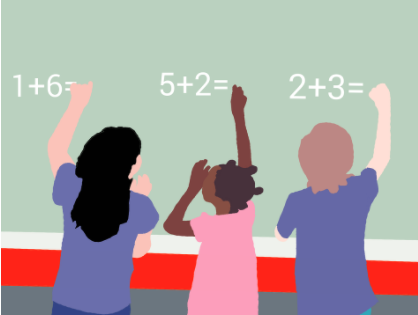
Making 10 With Ten Frames

Overview
Students will create and use a ten frames tool to help to understand counting, place value, number relationships, adding, and subtracting. Students can advance to numbers higher than ten once the concept is grasped. Ten frames help with fluency in addition and subtraction.
Learning Objectives
Students will:
- Be able to build addition and subtraction facts to ten (and higher) using ten frames by placing counters to illustrate numbers less than or equal to ten.
Vocabulary
Vocabulary Words:
-
Ten Frame: Ten Frame is a simple math tool that is a 2 x 5 rectangular frame used to make ten.
-
Addition: Addition is the process or skill of calculating the total of two or more numbers or amounts.
Pre-planning
To prepare for this lesson:
-
Preview the video Getting Started with Ten-Frames if unsure what a ten frame is.
-
Practice using the online math tool Ten Frames.
-
Here are additional video resources:
-
Students can sing along with the Ten Frames Song.
Accommodations
See Accommodations Page and Charts on the 21things4students.net site in the Teacher Resources.
Steps
Directions for this activity:
-
Introduce Ten Frames to the students by sharing any of the Ten Frame Videos and the Song.
-
Introduce the students to the Ten Frames online tool.
-
Students will be given an addition equation that does not go over 10.
-
Students will drag the counter chips on the online tool to match the equation.
Assessment Options
Different options for assessing the students:
- Observations
- Check for understanding
- Exit tickets with ten frame prepared for students.
- Class discussion of math talks, number talks.
- Create an assessment within the Learning Management System.
- FlipGrid for explaining.
MITECS Competencies & ISTE Standards
MITECS (Michigan Integrated Technology Competencies for Students): Michigan adopted a state-wide version of the "ISTE Standards for Students" and named them MITECS (Michigan Integrated Technology Competencies for Students) in 2018.
To learn more about MITECS, visit the State of Michigan's TechPlan.org website for definitions and support documents to assist you in the classroom.
Empowered Learner
1a. Students articulate and set personal learning goals, develop strategies leveraging technology to achieve them and reflect on the learning process itself to improve learning outcomes.
1b. Students build networks and customize their learning environments in ways that support the learning process.
1c. Students use technology to seek feedback that informs and improves their practice and to demonstrate their learning in a variety of ways.
1d. Students understand the fundamental concepts of technology operations, demonstrate the ability to choose, use and troubleshoot current technologies and are able to transfer their knowledge
Computational Thinker
5a. Students formulate problem definitions suited for technology assisted methods such as data analysis, abstract models and algorithmic thinking in exploring and finding solutions.
5c. Students break problems into component parts, extract key information, and develop descriptive models to understand complex systems or facilitate problem-solving.
5d. Students understand how automation works and use algorithmic thinking to develop a sequence of steps to create and test automated solutions.
Devices and Resources
Device: PC, Chromebook, Mac, iPad
Browser: Chrome, Safari, Firefox, Edge, ALL
App, Extension, or Add-on:
Websites:
Getting Started with Ten-Frames
CONTENT AREA RESOURCES
ELA
Write a set of directions on how to use ten frames with an upper grade peer helper.
Integrated Arts
- Students learn the Ten Frames song.
- Students create an illustration to show the ten frame addition equation.
Math
Create a math learning log page with a ten frames chart.place. The class has number talks and math talks on place
CREDITS
This task card was created by Julie Hoehing, Lake Shore Public Schools, May 2021.


